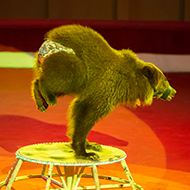
New campaign shows public support for 'reinvention' of circuses using animals.
To mark World Wildlife Day, UK-based charity Animal Defenders International (ADI) and the Eurogroup for Animals coalition have launched a new campaign calling for a Europe-wide ban on the use of wild animals in circuses.
In the European Union, 23 member states have now adopted national restrictions on the use of animals in circuses; however, some nations’ restrictions only apply to certain species.
The EU Stop Circus Suffering campaign aims to raise awareness of the suffering that animals in circuses endure, in an effort to prompt authorities and governments around the world to end their use.
Investigations carried out by ADI have shown the poor conditions that animals in circuses are kept in, as well as the harsh handling methods used to control them and the excessive amounts of time they spend shut in trucks and trailers.
A Savanta ComRes opinion poll conducted on behalf of Eurogroup for Animals asked the public for their views on animals in circuses in Czech Republic, France, Germany, Hungary, Italy, Poland and Spain.
The results showed that 68 per cent of respondents agree that the use of wild animals in circuses is cruel and 62 per cent say that the European Union should ban the use of all wild animals in circuses. 83 per cent of respondents added that the European Union need to guarantee that cruel uses of animals are not allowed.
Jan Creamer, president of ADI said: “Many European nations have recognised that circuses are no place for wild animals and implemented bans.
“However, bans at the national and regional level have not stopped wild animals from being trucked around the continent in the name of cruel entertainment. A Europe-wide ban is needed to free circus animals from their chains and cages, and end circus abuse in Europe once and for all.”
ADI and Eurogroup for Animals will continue to raise awareness through the EU Stop Circus Suffering campaign over the coming months.



 The Animal and Plant Health Agency (APHA) has updated its online reporting service for dead wild birds.
The Animal and Plant Health Agency (APHA) has updated its online reporting service for dead wild birds.